The Benghazi Committee Gets Its Moment In The Spotlight, And So Does Hillary Clinton
What will likely be the apex of the House Select Committee's investigation of the Benghazi attack begins and ends today with the testimony of former Secretary of State Hillary Clinton.
In a few short hours, most of the American political world will be glued to television sets and computer monitors watching the much-anticipated testimony of former Secretary of State Hillary Clinton before the House Select Committee investigating the attack on the American diplomatic outpost in Benghazi, Libya on September 12, 2012. The drama, however, will be as much about the 2016 campaign for the White House as it will the investigation of the events surrounding the attacks:
For days, Hillary Rodham Clinton has been sequestered inside her red brick home in Washington, poring over events that happened more than three years ago and half a world away.
Her preparations for the hearing on Thursday before the House of Representatives’ Benghazi committee have included reviewing broad themes, operational details and the innumerable emails related to the September 2012 attack on the United States Mission in Libya.
But for all of Mrs. Clinton’s mastery over the substance related to Benghazi, the hearing in many ways will amount to a test of patience and will: To succeed politically, she must remain calm, take every question seriously and avoid outbursts during what is expected to be a daylong appearance, even amid her private frustration over what she sees as a Republican-led effort to hurt her presidential prospects.
“They’ll try to attack the secretary on emails, question her server, feign righteous indignation,” said Representative Adam B. Schiff, Democrat of California, who has been highly critical of the committee’s motivations. But mostly, Mr. Schiff added, “They’ll hope to wear the secretary down.”
Mrs. Clinton’s testimony, in the Capitol Hill hearing room where she appeared as first lady to defend her proposed health care legislation in 1993, is expected to last eight to 10 hours. And although the committee will devote most of the inquiry to the security at American outposts in Libya and the response to an attack that killed four Americans, including Ambassador J. Christopher Stevens, the lines of questioning will also touch on her broader tenure at the State Department.
“Unless there is a new set of facts, which I firmly doubt,” said Thomas R. Nides, who was deputy secretary for management and resources under Mrs. Clinton and testified about the Benghazi attacks in 2012, “I don’t see how the testimony is going to be dramatically different than 18 months ago.”
But Mrs. Clinton was not a presidential candidate during previous inquiries into the Benghazi attacks, and on Thursday, members will probably also highlight wider questions about her tenure at the State Department, her dependence on the advice of a cadre of political aides and her overall approach in Libya. Mrs. Clinton had pushed the White House to join a NATO-led coalition to oust Col. Muammar el-Qaddafi, a move that is widely seen as contributing to the chaos and instability in the country and region.
“The idea that a blood bath of innocent people was imminent in western Libya had the West not intervened just did not bear out,” said Paul R. Pillar, a former C.I.A. analyst who teaches at Georgetown University. “It’s going to be a hazard for her.”
(…)
Mrs. Clinton has dismissed the Benghazi committee as a “partisan arm” of the Republican National Committee and called Representative Kevin McCarthy’s comments linking the investigation to her declining poll numbers “deeply depressing” and a “grave disservice” to the Americans killed in Benghazi.
But the former secretary of state, always a voracious student, has also prepared assiduously.
After an intense campaign schedule following the first Democratic primary debate last Tuesday, Mrs. Clinton has had no major events or fund-raisers the past several days. And her aides say that in many ways, preparing for the hearing is more difficult than a debate, for which a candidate can usually anticipate questions from a neutral moderator. Testifying before the Republican-led committee means Mrs. Clinton must contemplate the political motivation behind each inquiry; with every response, she must also anticipate the political traps, these advisers said.
“It’s easier in terms of substance; the harder part is the political dance involved,” said Lissa Muscatine, a longtime friend and speechwriter to Mrs. Clinton, adding, “You have to be really smart in how you actually respond to questions that might have ulterior motives.”
Mrs. Clinton has experience testifying before Congress and knows how mentally exhausting the experience can be. In addition to the 1993 testimony she gave about the Clinton administration’s proposed health care overhaul, Mrs. Clinton faced extensive questioning in 2009 during the confirmation hearings to become secretary of state.
She previously testified about Benghazi on May 8, 2013. Before that, two deputy secretaries of state, William J. Burns and Mr. Nides, testified in December 2012, after Mrs. Clinton sustained a concussion after fainting and was unable to testify.
Political critics will be looking for even the slightest sign of indifference or impatience on Thursday.
As Karen DeYoung at The Washington Post notes, the reality about the committee is that it has always been as much about politics as anything else:
From the start, investigations of the September 2012 attacks in Benghazi, Libya, that left four Americans dead, including the U.S. ambassador, have focused on three questions: Why was security insufficient at the Benghazi diplomatic compound? Why was there no timely U.S. military response? And why did the administration initially describe the attacks as a spontaneous protest, rather than a planned terrorist assault?
As the House Select Committee on Benghazi prepares to question former secretary of state Hillary Rodham Clinton on Thursday, those questions seem almost beside the point.
The answers, however unsatisfactory to some, have been provided repeatedly by Clinton and many other senior administration and intelligence officials over the past two years, as well as in a series of independent and bipartisan congressional reports, and are unlikely to change.
Instead, attention will be focused on how well Clinton, now the front-runner for the Democratic presidential nomination, and her Republican critics behave during what is expected to be at least eight hours of testimony.
Scheduled to begin at 10 a.m., the hearing is to consist of four rounds of questions lasting 10 minutes from each of its seven Republicans and five Democrats.
On the Republican side, members have been cautioned by their chairman, Rep. Trey Gowdy (S.C.), a former prosecutor, to stick to the facts and avoid providing ammunition to Democrats who accuse them of having a political vendetta against Clinton.
Expecting Republicans to use a rapid-fire prosecutorial technique that allows little time for long answers, Democrats are prepared to restate the majority’s questions and try to elicit more thoughtful responses, while also seeking to focus attention on what the administration has done to avoid such attacks in the future.
(…)
Gowdy told CBS’s “Face the Nation” on Sunday that the hearing “is about the three tranches of Benghazi, what happened before, during and after.” But he acknowledged that Clinton would “have a lot more information about the before than . . . the during and after.”
He indicated that questions would focus on what he said were new e-mails “we just received” from then-U.S. Ambassador J. Christopher Stevens, one of the four Americans killed in the attacks, to the State Department requesting more security during the months before the attacks. Another area of interest, Gowdy said, was a series of e-mails sent to Clinton’s private server by former aide Sidney Blumenthal.
The Blumenthal messages are long expositions on Libya’s internal politics, some sent before, but most after the 2012 attacks on Sept. 11 and 12. The messages — many of them released by the State Department this year — were later revealed to have been written by a former CIA officer who, along with Blumenthal, was seeking business opportunities in Libya.
Although the question of why Clinton was receptive to Blumenthal’s voluminous communications — some of which she forwarded to other State Department officials with his name removed — may elicit interesting and perhaps discomfiting testimony from the former secretary of state, it seems unlikely to reveal new information about security at the Benghazi installation.
From the beginning, it has been clear that the national controversy surrounding the attack on the Benghazi outpost was as much about domestic American politics as it was about international security or alleged concerns about the safety of American diplomatic personnel. Indeed, in large part because it happened in the course of the final months of a Presidential campaign, the attack started to become a partisan issue even before the bodies of the four dead Americans were returned home. In some sense, the roots of the political side of this argument can be traced to what many have called the Administration’s initially confused response to the attack that included blaming the attack on an obscure anti-Muslim video that had been posted on YouTube months earlier and had become the target of protests across the Muslim world even though there had been no protests in Benghazi that day. Shortly thereafter, there were reports that there had been at least some forewarning that an attack might take place, and the initial White House narrative seemed to have collapsed. For weeks and months afterward, Republicans contended that the Administration had spread this story in an effort to deflect attention from the attack and extent to which it undercut the Obama/Biden re-election message about having largely defeated al Qaeda since taking office. This contention was seemingly reinforced by revelations that the talking points released by the Administration regarding the attack in the weeks after the attack had been changed to remove any mention of organized terrorism. Additionally, legislators began to raise questions about whether there was adequate security at the compound at the time of the attack, and whether Ambassador Chris Stevens, who was among those killed in the attack, was thwarted in his efforts to obtain more security for the diplomatic compounds in Libya.
Over the course of the three years since the attacks, there have been numerous investigations about what happened in Benghazi that day, as well as the response before and after the attack and the issues surrounding embassy security. At least five separate Congressional committees have investigated the matter, including the House Intelligence Committee, and none of them have found any evidence of wrongdoing or impropriety. The questions regarding the Administration’s initial reliance on the claim that the attack was motivated by an obscure YouTube video now seems in retrospect to have been motivated largely by the CIA’s initial assessments in the days after the attacks, but the fact that the story was being spread in the midst of a highly partisan election led many to the conclusion that it was part of some kind of cover-up even though there is no evidence of the same. Despite all of that, though, Republicans on Capitol Hill were not satisfied with the investigations that had been conducted so far, and were certainly not satisfied with the answers Clinton had given in previous testimony. As a result, a Select Committee was formed in the House, and a new investigation was launched.
The most notable thing about the Select Committee’s investigation, of course, has been the fact that it has mostly been conducted behind closed doors and that it has been largely focused in recent months on things only tangentially related to the Benghazi attack itself. Although there have been numerous current and former government officials and employees interviewed by investigators and committee members, today’s hearing will be among the first public hearings the committee has held and may well be one of the last times it meets in public until a final report is released, something not likely to happen until just months before the 2016 General Election. For the past several months, the committee has seemed more focused on Clinton’s use of a private email server while Secretary of State than it has on the Benghazi attack itself. It’s because of this that the Committee has been criticized by Democrats as nothing more than excuse for partisan attacks on Clinton herself, an interpretation that’s hard to deny when you actually look at the evidence. Indeed, in many respects the potential political impact has been tarnished by Republicans such as Majority Leader Kevin McCarthy and New York Congressman Richard Hanna who have essentially admitted, inadvertently and otherwise, that the committee’s primary focus is causing political problems for Clinton rather than finding some new information about the Benghazi attack.
Because of the political overtones surrounding the committee and its work, then, the focus of today’s hearing won’t be be on what Clinton has to say in response to questions regarding the attack itself and the issues surrounding it. For the most part, those questions have already been asked and answered in the numerous investigations that have already been held. Instead, the focus will be on how Clinton answers the questions, and whether she provides any political ammunition to her opponents. In her last appearance before Congress on this issue, Clinton provided such a moment in the form of her now famous confrontation with Wisconsin Senator Ron Johnson and in which Clinton utters the now famous line“What difference, at this point, does it make?” Even Clinton’s allies seem to admit that it was a mistake for Clinton to lose her cool like that, and it’s likely that Republicans on the committee will attempt to goad her into similar responses today. If she can avoid that, though, and if she can avoid any real gaffes then it seems likely that she’ll get out of this hearing in fine shape. The only caveat to this would be if there is some smoking gun lurking out there that hasn’t been revealed yet, but given the number of investigations and leaks that have been made public so far that seems rather unlikely.
In any case, the hearings begin at 10am this morning and are expected to last well into the early evening. If you’re at all interested, I’m sure all the major cable news outlets, as well as C-Span, will be covering it extensively.
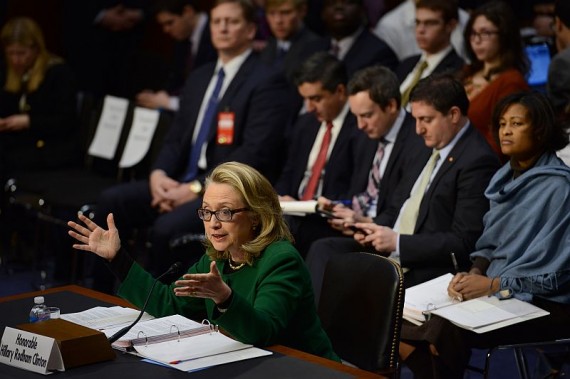

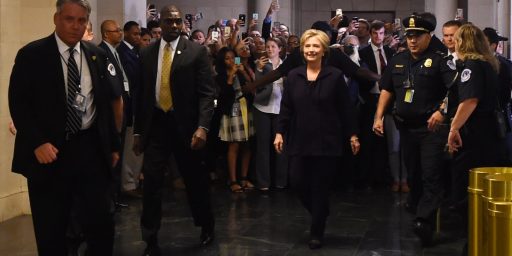
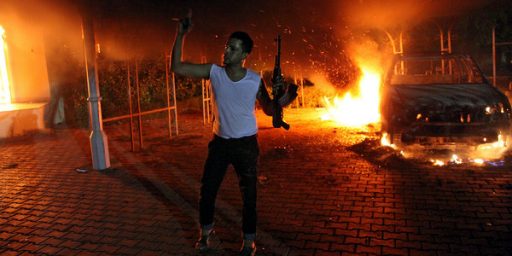
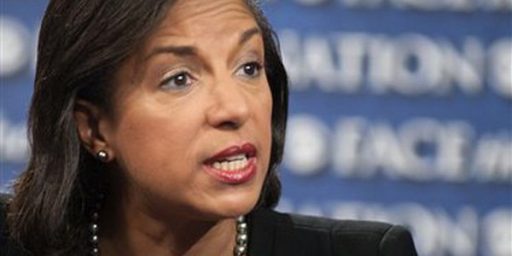
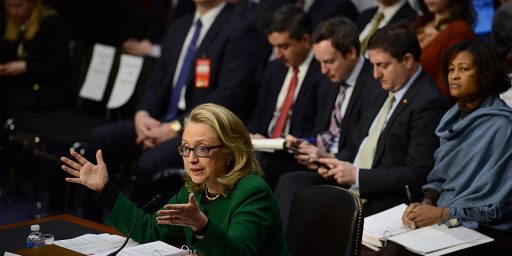
Sounds like super fun. Get out the popcorn. We’ll see how what’s-his-face tries to make a name for himself.
Doug Mataconis, master of understatment.
An expected 8 hours of testimony???
Republicans have been hounding these folks for decades and to what end? What has all the time and millions of dollars…wasted….done for the American people?
As the post points out…all these questions have been answered over and over again.
Unfortunately the party that brought you Watergate, Iran-Contra, Iraq, torture, and Scooter Libby, insists on trying to find some tiny morsel which they can then blow all out of proportion. To date…an Oval Office hummer.
Today’s Republicans really are a bunch of clowns.
@C. Clavin: What would you have them do, C.? Run on policy?
This is a Republican witch hunt, pure and simple, an act of political malice from a party capable of nothing else.
@michael reynolds:
I love that Senate Dems are sayng the RNC should pay for it, as it is a political exercise.
http://thehill.com/blogs/floor-action/senate/257583-senate-dems-want-rnc-to-pay-for-benghazi-committee
I’ve read the full quote in context, and in fact it wasn’t a gaffe:
Full context:
The truth is that Johnson was trying to be an a$$hole with a cheap shot, and she pushed back forcefully. There is nothing wrong with that. Sure , the quote was twisted out of context and was misused against her, notably by your fellow front pager James. But it wasn’t a mistake.
The definitive analysis on the Benghazi investigation. It starts:
RTWT, as they say.
This, as Kevin McCarthy reminded us, is not complex, or hard to understand.
Bombing of Marine Barracks in Beirut?
241 American marines dead, in retrospect, security not what it should have been.
Result, Republican president cuts losses and leaves region.
Fire and attack on consulate in Benghazi?
4 American foreign service staff dead, in retrospect, security not what it should have been.
Result, Republican-controlled Congress launches 8 consecutive investigations because they can, and because they’re not getting the result they want.
The so-called liberal media uses this formulation endlessly, even though it’s lazy, stupid and misleading. It’s a fallacy (known as the fallacy of bifurcation) to pretend that it had to be either “a spontaneous protest” or “a planned terrorist assault,” as if these two events are mutually exclusive. They are not. There was a protest, and there was also a terrorist attack. Also, both were indeed spontaneous.
Calling the video “obscure” is another popular right-wing lie. It was posted on Youtube on 7/1/12. It was relatively obscure until it was seen by millions on Egypt TV on 9/8. The Cairo riots started less than 48 hours later.
Yes, there was no protest “that day,” but there was a protest that night.
@stonetools: Thanks. I hadn’t known who this Koussa was.
“This is a Republican witch hunt…….”
Well, they found one.
@gVOR08: It appears that Doug has finally admitted that these hearings are part of a political effort to destroy HRC’s political campaign and nothing more. Congratulations. Perhaps he could also read this thorough (although somewhat lengthy) analysis of the various investigations and Republican talking points, some of which Doug regurgitates: http://www.newsweek.com/benghazi-biopsy-comprehensive-guide-one-americas-worst-political-outrages-385853.
@Guarneri:
Thanks for making my point with that sexist remark.
What are you, 90?
@stonetools: Sorry. I missed your post that referenced the same article. You beat me to it.
“Madam Secretary, you said that you only used one device for your e-mail. That was not true. You said that you only had one e-mail account. That was not true. You said, under penalty of perjury, that you turned over all your work-related e-mails. That was not true. I could go on, but I think the point is clear. What assurances can you give us that what you tell us today, under penalty of perjury, that what you will tell us the truth today?”
“Madam Secretary, you were essential in supporting the US policy of removing Kadaffi from power. What plans did you have for post-Kadaffi Libya that would have been better than Libya under Kadaffi?”
“Madam Secretary, your long-time associate Sid Blumenthal was an employee of yours at the Clinton Foundation. He even had a clintonemail.com e-mail account. He was also employed by various business interests who wanted to profit from the post-Kadaffi Libya. He sent you a great deal of information about Libya. Did you know that he was acting as a lobbyist? Do you know if he was registered as a lobbyist? When you forwarded his e-mails to your subordinates in the State Department, did you inform them that he was acting as a lobbyist for people interested in overthrowing Kadaffi?”
There are three very easy questions she should be asked.
I’m not so sure about that. I suspect that, at this point, she would actually gain more with her potential backers by calling the bluff. Now that it’s general public knowledge that the whole investigation was staged as an attack on her campaign, why does she have to pretend?
@michael reynolds:
I think that may be his IQ
@Guarneri:
““This is a Republican witch hunt…….”
Well, they found one.”
Christine O’Donnell is on the Committee? Who knew?
@Jenos Idanian:
Maybe they won’t ask those questions because they aren’t relevant to the issues surrounding the deaths in BenghazI?
Oh wait a second, considering this is a witch hunt, maybe they will ask those questions.
At the two hour mark, they haven’t laid a glove on Clinton.
I flipped to CSPAN at exactly the right moment — they were discussing Blumenthal’s emails and Elijah Cummings just went crazy. The Democrats on the committee did everything but openly revolt.
Gowdy used a troll tactic — he claimed Cummings only wanted Blumenthal’s transcript released, Cummings claimed passionately he wanted it all released, Gowdy retorts “even the names of the survivors?” There was an implied you monster afterwards based on the tone.
That Newsweek article is quite a read though, and exposes just how shameful this charade is. It’s too bad the GOP had their sense of shame surgically removed long ago, and the press is willing to lie to cover for the GOP (up until the point the GOP admits the truth publicly).
We need to get the trial of those responsible for this attack cranked up and going. Enough time has passed. No need for more of these congressional hearings.
Round two is over and HRC is wiping the floor with the Republicans, who are mostly coming across as political hacks with no interest in learning from the Benghazi tragedy. Nothing new here.
HRC should send flowers to the Republicans on the committee for hosting her coronation.
@stonetools: Maybe they won’t ask those questions because they aren’t relevant to the issues surrounding the deaths in BenghazI?
It might have escaped your notice, but Benghazi is in Libya. That’s that big country on the north coast of Africa, right next to Egypt. And the Benghazi attack was borne out of the post-Kaddafi chaos that Hillary claimed as one of her proudest accomplishments.
@Jenos Idanian #13:
I’m definitely sure you haven’t thought that line through to it’s logical conclusion.
@David M: Kaddafi wasn’t a threat, and his Libya was relatively stable. Bush had essentially gelded him — we didn’t need to whack him, because he’d had his come-to-Jesus moment. He hadn’t seen the light, but he certainly felt the heat. Bush even got him to surrender his WMD program — which was a hell of a lot more advanced than anyone had suspected.
There was no compelling reason for the US to support his overthrow, let alone actively participate in it, and plenty of reasons to simply stay hands-off. Instead, Obama and Hillary made that their war of choice, in direct contravention with US law.
So yeah, the logical conclusion is that it’s Bush’s fault, right?
@Tyrell: Umm, Tyrell, we don’t have any control over that because the person(s) who committed the attack is (are) a foreign national(s) (presumably Libyan) living in a foreign country (most likely Libya). While it hurts your delicate sensitivities to realize that America is not a place that gets to run justice for the entire world, it has always been that way because of the meaning of “sovereign” in the phrase “sovereign nation.”
I wish that your “very good” American history teacher in school had done a better job of explaining stuff like this to you while he was regaling you and your peers with exciting stories about battles and war heroes, but apparently, he didn’t, so you will need to catch up on your own now.